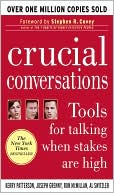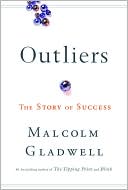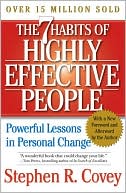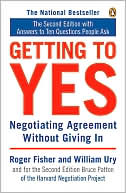The Human Equation: Building Profits by Putting People First
Why is common sense so uncommon when it comes to managing people? How is it that so many seemingly intelligent organizations implement harmful management practices and ideas? In his provocative new book, The Human Equation, bestselling author Jeffrey Pfeffer examines why much of the current conventional wisdom is wrong and asks us to re-think the way managers link people with organizational performance. Pfeffer masterfully builds a powerful business case for managing people effectively--not...
Search in google:
Why is common sense so uncommon when it comes to managing people? How is it that so many seemingly intelligent organizations implement harmful management practices and ideas? In his provocative new book, The Human Equation, bestselling author Jeffrey Pfeffer examines why much of the current conventional wisdom is wrong and asks us to re-think the way managers link people with organizational performance. Pfeffer masterfully builds a powerful business case for managing people effectively--not just because it makes for good corporate policy, but because it results in outstanding performance and profits. Challenging current thinking and practice, Pfeffer: --Reveals the costs of downsizing--and provides alternatives; --Identifies troubling trends in compensation, and suggests better practices; --Explains why even the smartest managers sometimes manage people unwisely; --Demonstrates how market-based forces can fail to create good people management practices, creating a need for positive public policy; --Provides practical guidelines for implementing high-performance management practices. Filled with information and ideas, The Human Equation provides much-needed guidance for managing people more wisely--and more profitably. "Distinguishing himself from other writers who tackle such topics in a touchy-feely way, Pfeffer has attempted to address corporate managers in a language they can understand: numbers."--The Washington Post Book World "One hopes that Pfeffer's book is read, not just by people who already agree with him, but by the CEOs and executives he so passionately directs his argument toward. If he's even partly right, we all could profit from his advice."--Training "The Human Equation is simplicity itself. Jeffrey Pfeffer shows that organizations that support, encourage, and build the skills of their people outperform all competitors. The power of committed minds and hearts working toward a common goal wins today and builds for tomorrow."--Frances Hesselbein, President and CEO, The Drucker Foundation Library Journal Pfeffer (Competitive Advantage Through People, LJ 2/15/94) argues persuasively that organizations typically fail to consider their culture and capabilities, particularly when planning for change. He addresses a number of people issues, such as downsizing, hiring practices, compensation approaches, and alignment of management practice with stated values. Although the author favors a fundamental approach, he shores it up with anecdotal information, logic, and wit, noting, for example, that downsizing does not eliminate costs but could be radically counterproductive (i.e., no expenses, no enterprise). Further, he gives examples of organizations that, while decidedly low-tech, manage to produce profits often associated with high-tech enterprises. Pfeffer further points out how a number of organizations in typically low-margin sectors outperform their competitors through an alignment of values. Indeed, Pfeffer's examples emphasize doing the right thing the right way. This book should be required reading for those planning organizational change.Steven Silkunas, SEPTA/FRONTIER, Lansdale, Pa.
What does it mean to put people first?\ 1) Say it, and often. Have people-centered values and goals. Publicly and repeatedly state the importance of people to organizational success. If senior leadership doesn't affirm the importance of people, little else will happen.\ 2) "Employees" no more. Use Language That Conveys Respect. Fix the company's language to wipe out terms that convey disrespect or disdain of its people. The term "worker" or even "employee" conveys someone who is in a subordinate role. Virgin Atlantic refers to its people, Wal-Mart has company associates; Whole Foods Market calls everyone, from the CEO down, a team member. Language influences how we see things, and so is useful in helping everyone to see people as important.\ 3) Prove it! Act on the belief that people are important. Provide everyone with access to the organization's leaders. At Southwest Airlines, every person has the home phone number of every company officer. This action symbolically tells people that all of them are important and are taken seriously in the firm. Another way to signal commitment to people is through training. Too many companies view training as a discretionary expense that can be readily cut in times of poor profits. Smart companies invest heavily in training, regardless of economic conditions.\ 4) Measure it! Assess how well the company is doing and acting on those measurements.\ At Hewlett-Packard, part of managers' performance evaluation depends on how well they are living up to the H-P Way, assessed through a survey of the people who work for them. Getting outstanding results in the right way-by treating people well,developing and retaining them-is the mark of success.\ 5) Invest in Developing Leaders Throughout the Organization Who Put People First.\ This is perhaps the most important step in putting people first, because it ensures that those in leadership positions have people-oriented values and ways of managing that are consistent with the company's philosophy and strategy. ServiceMaster, which provides cleaning and other services to hospitals, and other institutions, has recognized that its basic core competence-and the key to its outstanding business success in an industry with essentially no barriers to entry-is its ability to train and develop people.\ 6) Everyone counts. Recognize the importance of all of a company's people to success. Successful organizations recognize that all work is knowledge work-not just typical "knowledge-based" industries like management consulting and software. Is selling men's clothing knowledge work? It is to The Men's Wearhouse, which, through its training programs, not only generate more sales revenue from people better equipped to sell but also a more committed and motivated workforce-in part due to the enhanced self-esteem that comes from being taken very seriously. Putting people first means, in the end, taking all of them seriously-recognizing opportunities to leverage knowledge and build skills in all jobs, in all organizations.\ (From The Human Equation: Building Profits by Putting People First by Jeffrey Pfeffer, Adapted by permission of Harvard Business School Press. Copyright 1998 by the President and Fellows of Harvard College.) f Harvard College.)
Employee AttitudeEmployee LayoffsGovernment and BusinessHuman RelationsHuman Resources ManagementLabor and ManagementLabor RelationsLabor Unions
\ Library JournalPfeffer (Competitive Advantage Through People, LJ 2/15/94) argues persuasively that organizations typically fail to consider their culture and capabilities, particularly when planning for change. He addresses a number of people issues, such as downsizing, hiring practices, compensation approaches, and alignment of management practice with stated values. Although the author favors a fundamental approach, he shores it up with anecdotal information, logic, and wit, noting, for example, that downsizing does not eliminate costs but could be radically counterproductive (i.e., no expenses, no enterprise). Further, he gives examples of organizations that, while decidedly low-tech, manage to produce profits often associated with high-tech enterprises. Pfeffer further points out how a number of organizations in typically low-margin sectors outperform their competitors through an alignment of values. Indeed, Pfeffer's examples emphasize doing the right thing the right way. This book should be required reading for those planning organizational change.Steven Silkunas, SEPTA/FRONTIER, Lansdale, Pa.\ \ \ \ \ BooknewsArgues that much of the conventional wisdom in managing people in organizations in destructive to both employment relationships and organizational performance. Explores why even smart organizations fall into harmful patterns when managing people, and offers steps to achieve improved performance. Suggests alternatives to downsizing, examines the economic effects of labor unions, questions the assumption that market forces alone are sufficient, and explores positive roles for public policy. Annotation c. by Book News, Inc., Portland, Or.\ \








